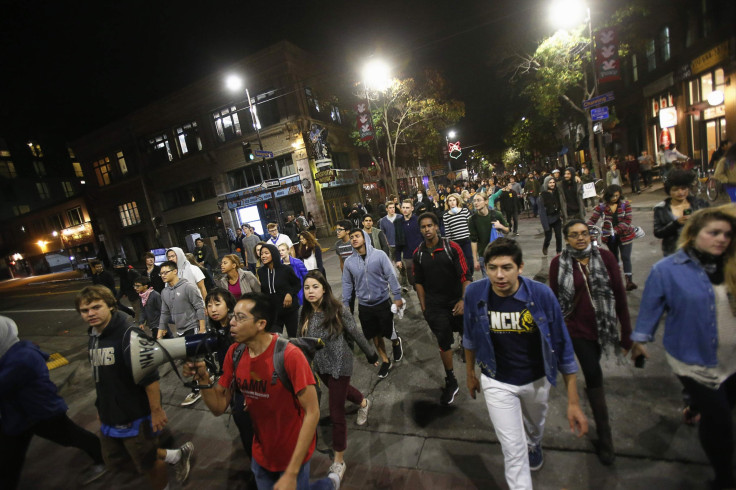Eric Garner Protests 2014: Columbia Law School Postpones Final Exams For Students Traumatized By Grand Jury Decision

Forget "My dog ate my homework." How about "I'm frustrated with the justice system" as an excuse for skipping classwork? Columbia University recently announced it would allow law students who feel traumatized by the recent grand jury decisions in New York and Missouri to postpone taking their final exams. Interim Dean Robert Scott emailed the New York City law school this weekend saying students who feel their performance was "sufficiently impaired" by the events and protests could request their tests be delayed.
"The grand juries’ determinations to return non-indictments in the Michael Brown and Eric Garner cases have shaken the faith of some in the integrity of the grand jury system and in the law more generally," Scott said, referencing the Nov. 24 and Dec. 3 decisions, respectively, not to charge white police officers Darren Wilson (Ferguson) and Daniel Pantaleo (Staten Island) with killing unarmed black men. The rulings have sparked protests across the country in past weeks, and the student demographic has been heavily involved nationwide.
At Columbia, exam rescheduling falls under the school's trauma policy. Scott said because the situation "threatens to undermine a sense that the law is a fundamental pillar of society designed to protect fairness, due process and equality," students can apply to have their tests moved. Columbia's website shows finals were scheduled through Dec. 17.
"Our trauma will be present with us on exam day, our trauma is inhibiting us from sleeping at night, and our trauma is ever-present among the words in our textbooks," the Columbia student coalition wrote in an open letter. "We are now asked to use the same legal maneuvers and language on our exams this Monday that was used to deny justice to so many Black and Brown bodies."
In his email, Scott invited students to discuss the implications of the non-indictments with professors and indicated he wanted to continue the conversation on campus next semester. Columbia faculty were creating a speaker series and teach-in, among other events, to dissect the law as it applied to the Brown and Garner cases.
Students at other schools were pushing for those sorts of forums to take place on their campuses. The law schools at Yale in Connecticut, New York University in New York and Stanford in California had already held events. After Scott's email went out, law students at Harvard in Massachusetts and Georgetown in Washington, D.C., started asking for dialogue, as well as exam accommodations.
The Harvard Law School Affinity Group Coalition sent an open letter to its dean, Ellen Cosgrove, asking that students be able to take tests after the established Dec. 19 end date for finals. "Delaying exams is not without precedent," the coalition said. "In 1970, Harvard Law School faculty voted to delay all exams in response to demands by students participating in antiwar protests." The dean declined.
At Georgetown, the student law coalition called for exam extensions due to "extraordinary circumstances." It also wanted the deans, Mitchell Bailin and William Treanor, to make a public statement on the Ferguson and Staten Island decisions. As of Tuesday morning, they had not.
Garner and Brown were both killed over the summer, with their deaths sparking nationwide unrest.
© Copyright IBTimes 2025. All rights reserved.






















